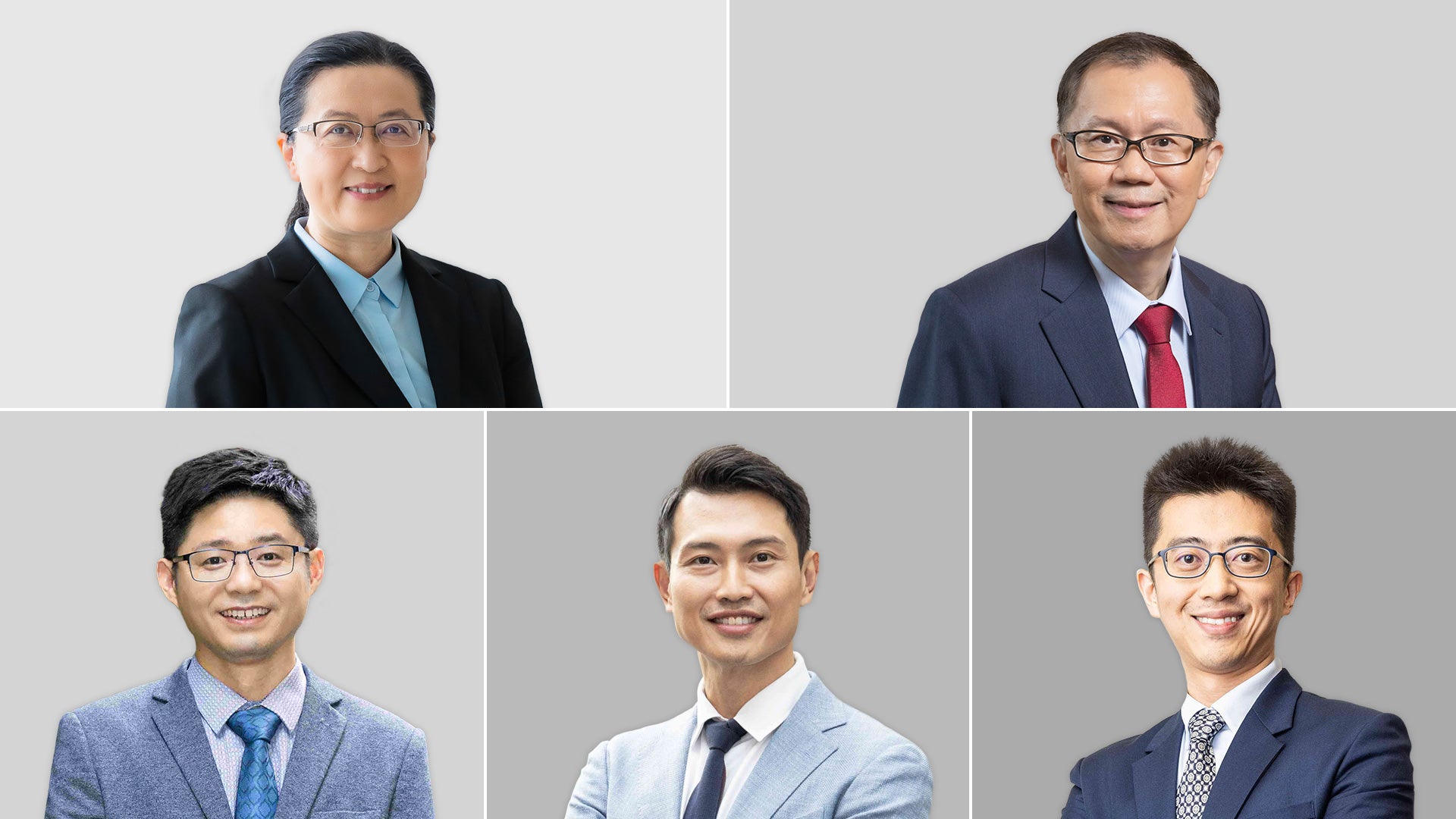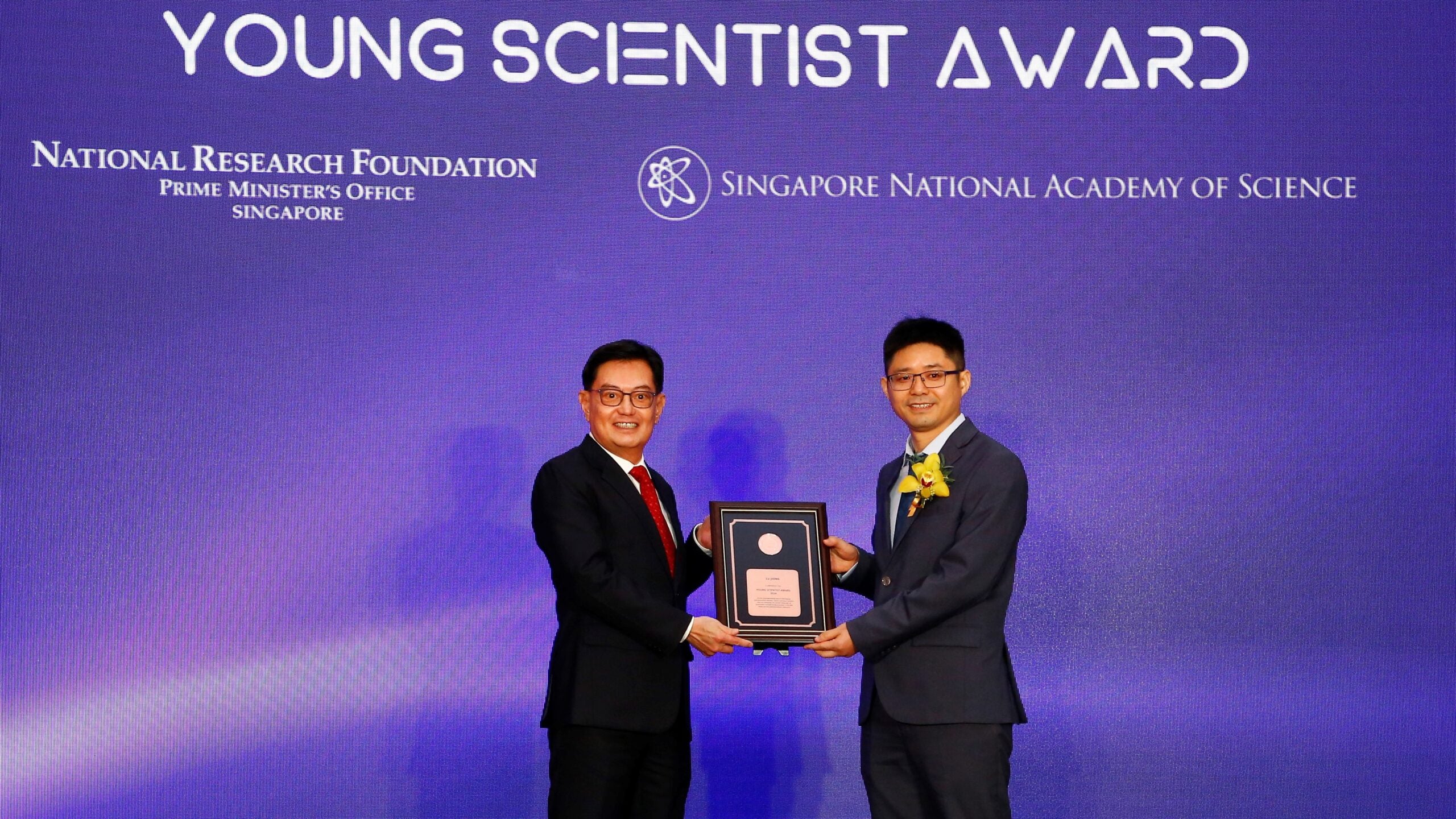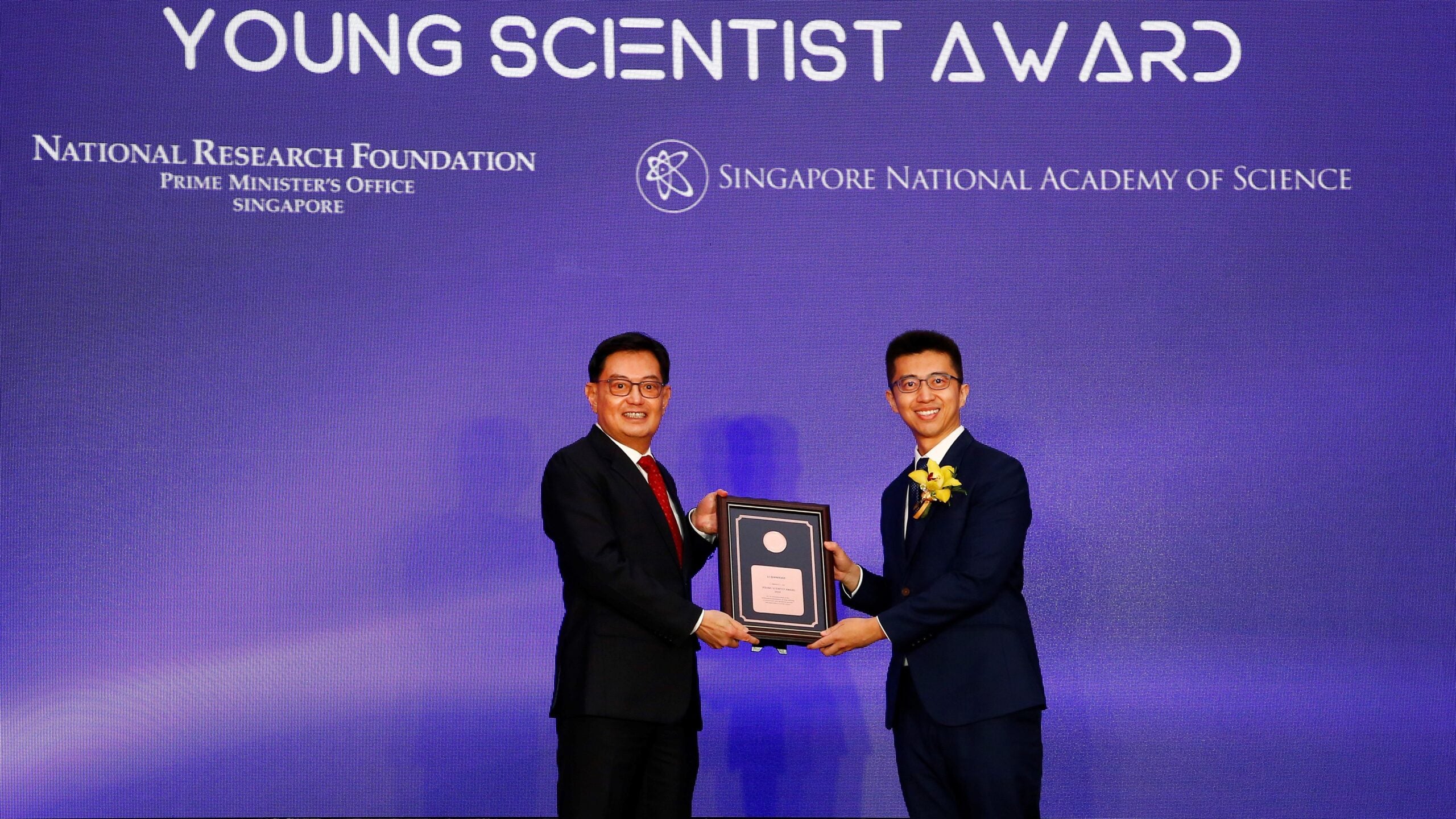Five NUS professors win nation’s highest awards for science and technology
September 30, 2024
(Clockwise from top left) Prof Liu Bin; Prof Ho Teck Hua; Asst Prof Li Qianxiao; Assoc Prof Daniel Ting; and Assoc Prof Lu Jiong received the nation’s top honours for their research excellence and contributions to Singapore’s science and technology landscape. [Photos: National Research Foundation, Singapore & NTU]
Five outstanding professors from NUS received the nation’s highest honours for scientists and engineers as a recognition of their outstanding achievements in their respective fields.
Organised by the National Research Foundation, Singapore (NRF), the President’s Science & Technology Awards (PSTA) honours the exceptional contributions of researchers based in Singapore who have also helped to advance the country’s strategic research priorities.
At a ceremony held on 27 September 2024, President of Singapore Tharman Shanmugaratnam presented the President’s Science Award to Professor Liu Bin, Tan Chin Tuan Centennial Professor as well as Deputy President (Research and Technology) at NUS. The PSA recognises accomplishments generally acknowledged by other Science and Technology (S&T) practitioners as being significant and impactful to their field.
Professor Ho Teck Hua, NUS University Professor and President of the Nanyang Technological University, was conferred the President’s Science and Technology Medal (PSTM) by President Tharman. This prestigious award is presented to individuals who have made distinguished, sustained and exceptional contributions, and play a strategic role in advancing Singapore’s development through the promotion and management of S&T.
Three research stars at NUS received the Young Scientist Award (YSA) from Mr Heng Swee Keat, Deputy Prime Minister and Chairman of NRF. These highly accomplished scientists are: Associate Professor Lu Jiong from the Department of Chemistry at the NUS Faculty of Science; Associate Professor Daniel Ting Shu Wei from the Singapore National Eye Centre, Duke-NUS Medical School, and the Department of Biomedical Engineering at the College of Design and Engineering; and Assistant Professor Li Qianxiao from the Department of Mathematics at the NUS Faculty of Science.
The YSA is awarded to researchers aged 40 years and below who are actively engaged in R&D in Singapore, and who have shown great potential to be world-class researcher in their fields of expertise. It is administered by the Singapore National Academy of Science and supported by NRF.
These awards, won by individual researchers and administrators in fields as diverse as organic functional materials and ophthalmology, demonstrate the strength of NUS’ research communities and commitment to scientific excellence.
The five award-winning scientists, with the support of their colleagues and institutions, have helped to push the boundaries in their respective fields, creating profound value and impact for both NUS and Singapore.

Addressing major challenges in science and technology now requires closer collaboration among diverse teams of experts, according to Assoc Prof Lu Jiong whose research on green catalysts won him the YSA. (Photo: National Research Foundation, Singapore)
2024 Young Scientist Award Recipient: Associate Professor Lu Jiong
Assoc Prof Lu Jiong, from the Department of Chemistry at the NUS Faculty of Science, received the YSA for developing novel catalysts that significantly advance sustainable chemical manufacturing processes.
Assoc Prof Lu, who is also a Principal Investigator at the NUS Institute for Functional Intelligent Materials and an NUS alumnus, works at the forefront of next-generation materials and catalytic technologies, focusing on achieving atomic-level precision and high sustainability. His pioneering work promises significant economic and environmental benefits, particularly in transforming manufacturing processes in the fine chemicals and pharmaceuticals industries.
These industries are major sources of air pollution, with some studies showing that the carbon footprint of the pharmaceutical industry surpasses that of the automotive industry. Currently, the catalysts used in these industries face several challenges, including high production costs, difficulties in separation and reuse, and the risk of harmful metal contamination.
Under Assoc Prof Lu’s leadership, his team developed advanced catalysts that not only achieved significantly higher yields and greater efficiency, but also saw a remarkable 10-fold reduction in environmental impact and production cost compared to conventional options.
Assoc Prof Lu is also dedicated to nurturing the next generation of researchers. Several members of his team have since established successful careers in other prestigious institutions, emerging as influential leaders in their respective fields.
“I am deeply grateful for the PhD training I received at NUS, which provided a solid foundation for my academic career and helped me gain a deeper understanding of the research ecosystem here,” he shared.
“Being closely connected with NUS, I feel a strong sense of responsibility to contribute to its research excellence and global impact. I am also truly honoured to receive this award, which recognises my team’s efforts and encourages me to continue driving innovation to position NUS – and Singapore – as a leader in the field.”
Read the full citation here.

Mathematics is less about numbers, but more about logic and concepts, according to Asst Prof Li. His work examines how deep learning models, which uses layers of “artificial neurons”, can express very complex relationships between things. (Photo: National Research Foundation, Singapore)
2024 Young Scientist Award Recipient: Assistant Professor Li Qianxiao
Asst Prof Li Qianxiao, from the Department of Mathematics at the NUS Faculty of Science, was awarded the YSA for his innovative work on the mathematical foundations of deep learning, its connections with dynamical systems, and applications in AI for science.
Asst Prof Li pioneered the understanding of how expressiveness – the ability to learn arbitrary relationships – arises in deep neural networks. Together with his research team, they revealed the intricate connections between this modern technology and classical mathematics. This has not only improved our understanding of how and when deep learning works, but also how to systematically improve its performance in new application settings.
“Machine learning research is a fast-moving field, and we have witnessed rapid developments in the last 10 years, from classical supervised learning to modern foundation models. Yet, some fundamental questions remain unsolved, and many of them are mathematical in nature,” said the Presidential Young Professor who joined NUS in 2019. Asst Prof Li is also a Principal Investigator at the NUS Institute for Functional Intelligent Materials.
Asst Prof Li’s work is highly interdisciplinary, and he has published in leading journals spanning the fields of mathematics, computer science, and the sciences. “One important advice I have received was from my PhD advisor, Prof E Weinan, from Princeton University. He held the firm view that applied mathematics research must be connected to the broader scientific community,” he shared.
“This principle has driven my research since, and reminded me that I must constantly learn from and talk with scientists from other fields to formulate good research questions,” he said. “NUS has provided me with the opportunity, resources, and freedom to pursue research in my areas of interest, for which I am very grateful.”
Read the full citation here.


